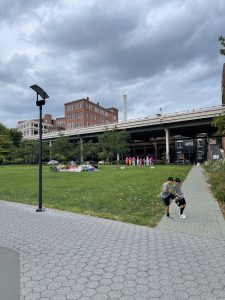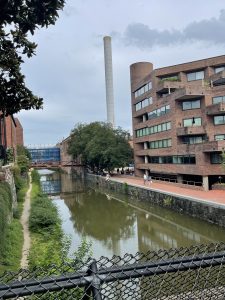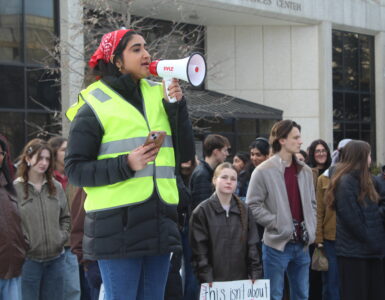Homelessness is still an issue across the District, and the National Park Service has pledged to work with social service providers to put an end to all encampments on all NPS lands by the end of 2023.
“There’s been some discussions recently that’s going to lead to a change in posture from the National Park Service in terms of how encampments are handled on a local scale,” said US Park Police Captain Jon Hofflinger at an Oct. 4 Advisory Neighborhood Commission meeting for District 2E.
In a press release from the National Park Service given to the Wash, the NPS said it “has begun a gradual enforcement of its no-camping regulation (36 CFR § 7.96) with the goal of full enforcement across all national park lands in the District by the end of 2023.”
The agency has pledged to take a social services-first approach, working in collaboration with local social service provides as it begins to expand and re-enforce their no-camping regulation in parks across the District.
The National Park Service “will continue to work closely with the District to coordinate social services for unsheltered individuals on park lands as we implement this change in approach to unsheltered encampments at our sites.”
At the ANC meeting, Hofflinger said, Park Service areas in the Georgetown, which include the Georgetown Waterfront Park, the C&O Canal, the Francis Scott Key Park and a number of historical properties, haven’t seen the volume that there may be in the central downtown area.

Beginning in June of this year, the Park Service began enforcement of its no-camping regulation by clearing two homeless encampments located on federal land at Columbus Circle in front of Union Station and another located at 11th Street, NW and New York Avenue NW.
The NPS had stepped backed its no camping policy in the District during the pandemic, unless the structures were causing hazards.
This relaxation of its no camping policy was at the behest of the federal government for the past two years, as the government advised agencies like the NPS to allow unhoused populations to stay put as part of their pandemic-related policies.
However, the output of these polices are disjointed with many homeless residents not knowing where to go next.
The National Park Police declined to comment on the recent actions taken to remove homeless encampments from local parks.
Helen Gebregiorgis, a D.C. transplant from Chicago who worked as a psych coordinator at an afterschool program for the kids that lived at a local shelter, spoke passionately about the treatment of homelessness within the District.
“I have mixed feelings, and I feel like a lot of people don’t understand homelessness, it’s not one type of way of being it’s like there’s multiple reasons why people end up with homeless. I think there’s a lot of judgment when people see an individual, there could be health reasons, mental health reasons,” Gebregiorgis told the Wash.
“At the end of the day we’re human beings, and we treat people who are homeless very inhumane,” she said.
When asked about the recent dismantling of homeless encampments in the District, Gebregiorgis said she was frustrated and heartbroken by the attention brought to the issue and the lack of action to go along with it

“Housing is an issue here in DC — it’s a huge issue — there’s a shortage of houses and a lot of vacant homes that could be used and developed into affordable housing but instead these homes stay vacant.”
Gebregiorgis said that hearing people’s stories that have been affected by homelessness is the first step of many in getting D.C. residents to take action.
“I think about the importance of building people power. With organizing you have to build that, in order for some sort of action to be taken and it starts small by listening directly to the people who are being impacted and there needs to be some sort of alinement to the question ‘what are we going to do about this?”
Last year, Mayor Bowser opened the Terrel in Ward 1, the District’s eighth new shelter, realizing her 2014 campaign pledge to bring shelters to every ward in the District. Since the Bowser Administration’s Homeward D.C. was implemented in 2016, homelessness has been down by a total of 47% and 13.7% in the past year, the administration said in a press release earlier this year.
Georgetown hosts the Georgetown Ministry Center, which features a drop-in center, street outreach and a winter shelter.
Although, D.C. residents say that homelessness is still an issue with a lack of affordable housing.
Chicago native Aaron Bivens, a homeless man that was panhandling on the corner of Wisconsin Avenue, NW and M Street, NW told the Wash that he was just surviving, struggling to get along with the other unhoused residents that frequent the local shelter.
“Man, it’s rough, it’s degrading. I mean different folks feel different ways. I’m not used to it,” Bivens said.
“I’ll put it like this, like I go to a shelter, I’m treated totally different. They’ll steal everything I have because I’m not from here, so I mostly sleep on the streets. You know, I can’t survive, I see the way they treat other people it’s not the same. I can only speak for myself and for me it’s rough but because of that man above, I got a chance, because come November the first, I move into my place, they gave me a voucher.”















Add comment